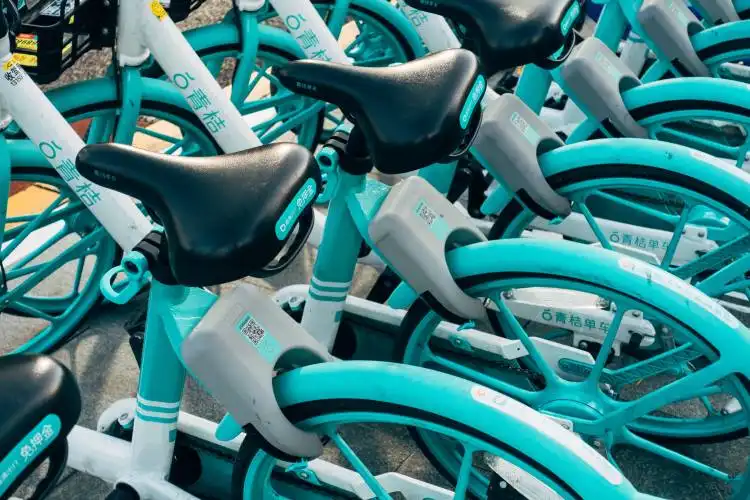Start a Camper Rental Business
Bringing Unique Travel Experiences to Life while Steering Profitability
| Updated


CAMPER RENTAL BUSINESS
Consider this engaging prospect: a Camper Rental Business. Picture this enterprise as your ticket to aiding adventurers en route to making cherished memories. Quite simply, this business rents out camper vans or mobile homes to travelers, explorers, and vacation dwellers craving for a personalized getaway on wheels. Get ready to map your entrepreneurial journey along breathtaking scenic routes, balancing the wheel of profit and pleasure. Remember, in this venture, it's not just about renting a vehicle, it's about selling a unique travel experience.
Jump to Business Plan
RELATED BUSINESS IDEAS
Browse ALL Rental & Delivery Services Business Ideas
Discover Your Perfect Domain
Unlock the door to your online success with our hand-picked selection of premium domain names. Whether you're starting a new venture or rebranding an existing one, the right domain can set the tone for your digital presence. Browse through our curated list, each with its unique potential to enhance your brand's visibility and credibility.
CAMPER RENTAL MINI BUSINESS PLAN
This a quick reality check to help you identify the strengths and weaknesses of your business concept before you dive in.
Business Idea: Camper Rental Business
Expected Percent Margins:
- Gross Margin: 50%
- Net Profit Margin: 10-30%
Earnings Expectations:
- Daily Earnings: $100 - $300
- Weekly Earnings: $700 - $2,100
- Monthly Earnings: $2,800 - $8,400
- Annual Earnings: $33,600 - $100,800
Actions to Hit Those Numbers:
Inventory Management:
- Initial Investment: Minimum $50,000 - $100,000 for purchasing 1-3 well-equipped, modern campers.
- Camper Maintenance: Budget around $200-$500 per month per camper for cleaning, servicing and repairs.
Marketing and Customer Acquisition:
- Online Presence: Create a user-friendly website and listings on camper rental and travel websites.
- Social Media: Regularly post images of your campers and beautiful locations where they are used on platforms like Instagram and Pinterest.
Sales and Customer Experience:
- Quality of Service: Ensure campers are clean and fully stocked. Offer add-ons like camping gear, GPS, etc.
- Customer Engagement: Collect customer feedback for continuous improvement.
Cost Control:
- Storage: An open land space for parking the campers when they're not rented. Keep this cost below 5% of expected monthly income.
Business Operations:
- Booking System: A transparent and easy-to-use booking system.
Revenue Channel:
- Camper Rent: Rental fees should be competitive in your area. Check what others are charging for comparable campers.
- Add-Ons: Upsell extras like camping gear, pre-packed food, and activity guides.
These numbers are generalized estimates and can vary greatly depending on many factors including the location of your business, the quality of your campers, and the time and effort you put into marketing your service. Always tailor your strategy to match your specific situation and the unique features of your local market.
NOT WHAT YOU HAD IN MIND? Here are more ideas



Browse ALL Rental & Delivery Services Business Ideas
Grab Your Business Website Name
Before you get caught up in the whirlwind of setting up your business, invest in a domain name. It's a small but significant step that lays the foundation for your brand and makes it easier for customers to find and trust you. Just like you wouldn't build a house without securing the land first, don't build a business without securing your domain name.
"Why? Can't that wait?" Here's why it shouldn't
Step 1: Determine if the Business is Right for You
Breakdown of Startup Expenses
Before starting a camper rental business, it is important to understand the startup costs associated with the venture. These costs can include the cost of the camper itself, any necessary repairs and maintenance, insurance, and any necessary permits or licenses. Additionally, you may need to purchase additional equipment such as camping gear, a tow vehicle, and other items. It is important to research the costs associated with each of these items and to create a budget for the startup of the business.
Breakdown of Ongoing Expenses
In addition to the startup costs, it is important to consider the ongoing costs associated with running a camper rental business. These costs can include insurance, maintenance, storage, and advertising. Additionally, you may need to consider the cost of any additional equipment you may need to purchase for the business. It is important to research the costs associated with each of these items and to create a budget for the ongoing expenses of the business.
Examples of Ways to Make Money
Once you have determined the startup and ongoing costs associated with the business, it is important to consider how you will make money. Examples of ways to make money with a camper rental business include charging a daily or weekly rental fee, charging a cleaning fee, and offering additional services such as delivery and setup. Additionally, you may want to consider offering discounts for longer rentals or for returning customers. Researching the market and understanding the competition is important to ensure that you are able to make a profit.
Step 2: Name the Business
Naming a business is an important step in the process of starting a camper rental business. It is important to come up with a name that will be memorable and that will represent the business in a positive light. It should also be easy to spell and pronounce. Some tips for naming a business include:
- Brainstorming: Take some time to brainstorm potential names for the business. Think of words that are related to camping, camper rentals, and other related topics.
- Research: Once a few names have been chosen, research those names to make sure they are not already in use. It is important to make sure the name is unique and not already taken.
- Keep it Simple: Try to come up with a name that is easy to spell and pronounce. This will help customers remember the name and make it easier for them to find the business online.
- Consider Branding: Think about how the name will fit into the overall branding of the business. It should be consistent with the logo, colors, and other elements of the business.
- Get Feedback: Ask friends and family for their opinions on potential names. This can help narrow down the options and make sure the name is well-received.
Once a name has been chosen, it is important to make sure the name is legally available and can be trademarked. This will help protect the business from potential legal issues in the future. Additionally, it is important to register the business name with the local government and obtain any necessary permits or licenses. This will help ensure the business is in compliance with local laws and regulations. Finally, it is important to secure a domain name and create a website for the business. This will help customers find the business online and will provide a platform for advertising and marketing the business.
Step 3: Obtain Necessary Licenses and Permits
Before starting a camper rental business, it is important to obtain the necessary licenses and permits. Depending on the location, this may include a business license, a sales tax permit, and a health permit. It is important to research the specific requirements for the area in which the business will be located. Additionally, it is important to check with the local zoning board to make sure that the business is allowed in the area. Furthermore, it is important to check with the local fire department to make sure that the business meets all safety requirements. Finally, it is important to check with the local insurance company to make sure that the business is properly insured. All of these steps are necessary in order to ensure that the business is compliant with local laws and regulations.
Step 4: Secure a Location
Once you have determined the right business endeavor and named the business, the next step is to secure a location. This is a crucial step in starting a camper rental business. Depending on the size of the business, you may need to rent a space or purchase a property. When selecting a location, consider factors such as access to roads, availability of utilities, and proximity to potential customers. Additionally, you should research zoning regulations to ensure that the business is allowed in the area. If you are renting a space, make sure to read the lease agreement carefully and understand the terms and conditions. If you are purchasing a property, you should consult a real estate attorney to ensure that the transaction is legal and binding. Finally, you should consider the cost of the location and how it fits into your budget.
Step 5: Purchase Equipment
Once you have determined the type of camper rental business you want to start, you will need to purchase the necessary equipment. This includes the camper, any towing equipment, and any other necessary items. You will also need to purchase insurance for the camper and any other items you will be renting out. Additionally, you may need to purchase any necessary permits or licenses required by your local government. You should also consider purchasing any necessary safety equipment, such as fire extinguishers or first-aid kits, to ensure the safety of your customers. Finally, you should also consider purchasing any necessary marketing materials, such as business cards or flyers, to help promote your business.
Step 6: Market Your Business
Once you have your business set up and ready to go, it's time to start marketing. This is a crucial step in getting your business off the ground and ensuring that people know about it. There are a few different ways to market your camper rental business.
First, you should create a website and social media accounts to promote your business. This will allow you to reach a wider audience and make it easier for potential customers to find you. You can also create a blog to share helpful tips and advice about camping and camper rentals. Additionally, you should consider creating a newsletter to keep customers informed about your business and any special offers or discounts you may have.
Second, you should consider using traditional marketing methods such as print ads and radio or television commercials. While these methods may be more expensive, they can be effective in reaching a wider audience.
Third, you should consider attending trade shows and other events related to camping and camper rentals. This will give you the opportunity to meet potential customers and show them what your business has to offer.
Finally, you should consider using online advertising such as Google AdWords or Facebook Ads. These methods can be very effective in targeting potential customers and driving traffic to your website.
Step 7: Set Up a Booking System
Setting up a booking system is a crucial step in starting a camper rental business. A booking system allows customers to reserve a camper for a certain date and time. It also allows customers to pay for their rental online. To set up a booking system, you will need to find a reliable software provider. Look for a provider that offers features such as online payments, customer reviews, and availability calendars. You can also consider integrating your booking system with your website or social media accounts. Once you have chosen a provider, you will need to create an account and configure the system to meet your needs. This includes setting up payment methods, adding rental rates, and creating customer profiles. You will also need to set up any additional features you may need, such as a loyalty program or discounts. Finally, you should test the system to make sure it is working properly before you start taking bookings.
Step 8: Set Up Insurance
Setting up insurance is an important step when starting a camper rental business. It is important to make sure that the business is properly insured to protect the business from any potential liabilities. There are several types of insurance that should be considered when setting up a camper rental business. These include general liability insurance, property insurance, and vehicle insurance. General liability insurance will protect the business from any claims of negligence or injury. Property insurance will protect the business from any damage to the property or equipment. Vehicle insurance will protect the business from any damage to the vehicles that are rented out.
It is important to research the different types of insurance available and find the best coverage for the business. It is also important to shop around and compare rates from different insurance companies. Working with an experienced insurance agent can help ensure that the business is properly covered. It is also important to make sure that the insurance policy covers any potential liabilities that may arise from renting out the campers.
In addition to insurance, it is important to consider setting up a trust account. This will help protect the business from any potential claims from customers. A trust account will also help protect the business from any potential lawsuits.
Finally, it is important to make sure that all of the campers are properly maintained and inspected regularly. This will help ensure that the campers are safe and in good condition for rental. It is also important to make sure that all of the campers are properly insured and that the insurance policy covers any potential liabilities that may arise from renting out the campers.
Step 9: Hire Employees
The ninth and final step in starting a camper rental business is to hire employees. Depending on the size of the business, it may be necessary to hire employees to help with the day-to-day operations. When hiring employees, it is important to consider the type of skills and experience they have and how they will fit into the business. It is also important to consider the cost of hiring employees and the potential benefits of having them on staff. When hiring employees, it is important to ensure that they are properly trained and have the necessary qualifications to do the job. Additionally, it is important to ensure that the employees are properly compensated and that they are provided with the necessary benefits and protections. Finally, it is important to ensure that the employees are properly managed and that they are given the opportunity to grow and develop within the business.
EXPLORE MORE CATEGORIES
Browse ALL Business Idea Categories
TAKE THE NEXT STEPS









